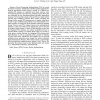Free Online Productivity Tools
i2Speak
i2Symbol
i2OCR
iTex2Img
iWeb2Print
iWeb2Shot
i2Type
iPdf2Split
iPdf2Merge
i2Bopomofo
i2Arabic
i2Style
i2Image
i2PDF
iLatex2Rtf
Sci2ools
111
click to vote
INFOCOM
2010
IEEE
2010
IEEE
Refresh: Weak Privacy Model for RFID Systems
—Privacy-Preserving Authentication (PPA) is crucial for Radio Frequency Identifcation (RFID)-enabled applications. Without appropriate formal privacy models, it is difficult for existing PPA schemes to explicitly prove their privacy. Even worse, RFID systems cannot discover potential security flaws that are vulnerable to new attacking patterns. Recently, researchers propose a formal model, termed as Strong Privacy, which strictly requires tags randomly generate their output. Adopting the Strong Privacy model, PPA schemes have to employ brute-force search in tags’ authentications, which incurs unacceptable overhead and delay to large-scale RFID systems. Instead of adopting Strong Privacy, most PPA schemes improve the authentication efficiency at the cost of the privacy degradation. Due to the lack of proper formal models, it cannot be theoretically proven that the degraded PPA schemes can achieve acceptable privacy in practical RFID systems. To address these issues, we propose a ...
Related Content
| Added | 28 Jan 2011 |
| Updated | 28 Jan 2011 |
| Type | Journal |
| Year | 2010 |
| Where | INFOCOM |
| Authors | Li Lu, Yunhao Liu, Xiang-Yang Li |
Comments (0)

